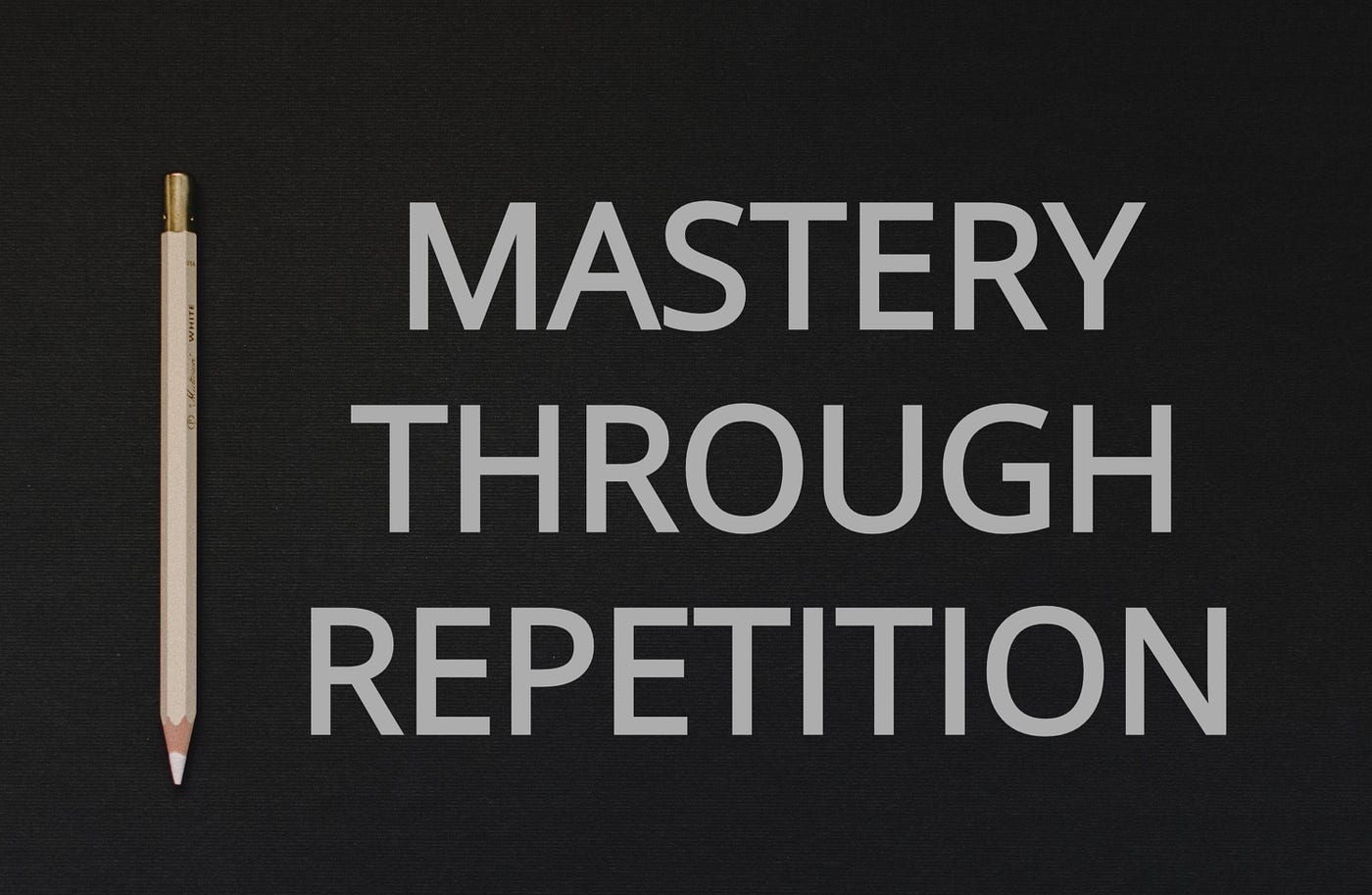Repetition is crucial for learning and memory consolidation for performers and audiences, so we cannot play down its importance during and after performance. When information or actions are repeated, it reinforces neural pathways, making it easier for the brain to recall and retain that information. Repetition has the power to reinforce ideas and concepts, enhance memory and learning, create emphasis and impact, establish patterns and rhythms, elicit emotional responses, and influence opinions and behavior.
Additionally, repetition can help to make information more accessible and familiar, increase engagement and comprehension, and strengthen the overall structure and coherence of a message or piece of writing.
The ability to master the act of repetition
The ability to master repetition varies among individuals and depends on factors like motivation, discipline, and cognitive processes. Some people naturally excel at repetitive tasks, while others may find it challenging. Consistent practice, focused attention, and a clear understanding of the desired outcome can enhance one’s ability to master the act of repetition over time.
The repetition of lyrics in music plays a crucial role in enhancing the overall impact and meaning of a song.
Here are some reasons why repetition is important in lyrics:
1. Emphasis and reinforcement: Repeating a particular line or phrase emphasizes its significance and reinforces its message. It allows the artist to drive home a specific idea or emotion, making it more impactful and resonant with the listener.
2. Connection and familiarity: Through repetition, listeners become familiar with the lyrics and can develop a deeper connection to the song. It creates a sense of comfort and recognition, as repeated lines become like a musical motif that ties the song together.
3. Emotion and intensity: Repeating certain words or phrases can intensify the emotions being conveyed in a song. By emphasizing and repeating powerful lyrics, artists can evoke stronger emotional responses from their audience.
4. Unity and cohesiveness: Repetition helps create unity and cohesiveness within a song. By repeating certain lines or themes, artists can weave a consistent thread throughout their lyrics, contributing to the overall structure and narrative of the song.
Chanting: Chanting is a common practice in many spiritual traditions, including Christianity, Buddhism, and Sufism. The repetition of sacred words or phrases, often accompanied by rhythmic music or movement, is believed to create a meditative and trance-like state, allowing the practitioner to connect with the divine, deepen their prayer or meditation experience, and awaken their spiritual consciousness.
Overall, repetition in lyrics serves many purposes, including catchiness, emphasis, emotional impact, familiarity, and unifying the song. It plays a significant role in creating memorable and powerful music.
The spiritual significance of repetition varies across different religious and spiritual practices. Here are a few examples: Overall, the spiritual significance of repetition lies in its ability to create rhythm, focus, and intention, as well as to quiet the mind and open the heart to spiritual experiences. It can provide a pathway to transcendence, connection with the divine, and union with one’s higher self.
Disadvantages of repetition
One disadvantage of repetition is that it can lead to boredom or a lack of interest. When something is repeated too often, it can become tedious and predictable, which may cause individuals to lose their focus or engagement with the material.
Another disadvantage is that repetition can hinder creativity and innovation. It can restrict thinking to a predefined set of patterns or ideas, preventing individuals from exploring new perspectives or approaches.
Additionally, excessive repetition may also lead to a lack of learning retention. When information or tasks are repeated without variation, the brain may not encode the information as effectively, making it harder to remember or apply in the future.
Furthermore, too much repetition can create a sense of staleness or monotony, which can negatively impact motivation and productivity. When tasks or activities are continuously repeated without variation, individuals may struggle to find meaning or enjoyment in what they are doing.
Lastly, repetition can be time-consuming. Repeating tasks or information unnecessarily can waste time and effort that could have been allocated to more productive or meaningful activities. It can also lead to a decrease in overall efficiency and effectiveness.
To strengthen the focus on repetition, one can implement the following strategies:
1. Create a structured routine: Establishing a consistent schedule and allocating specific time slots for repetitive tasks can help train the mind to focus during those designated periods.
2. Set specific goals: Clearly define the objectives or outcomes you aim to achieve through repetition. Having a specific target in mind can enhance focus and motivation.
3. Break it down: If a task or concept feels overwhelming or monotonous, break it down into smaller, manageable parts. Focusing on one step at a time can make the repetition more manageable and less overwhelming.
4. Use different modalities: Incorporate different senses or learning styles when engaging in repetitive activities. For example, if you’re trying to memorize information, read it aloud or create visual aids to reinforce the learning process.
5. Find motivation and purpose: Connect the repetitive task to a larger goal or purpose to maintain focus and engagement. Understanding why repetition is necessary and how it contributes to a greater outcome can help sustain motivation.
6. Seek feedback and reflection: Regularly evaluate your progress and identify areas for improvement. This self-reflection can help maintain focus by providing a sense of purpose and direction.
7. Introduce variation: While repetition is important in certain contexts, introducing slight variations in the task or approach can help prevent boredom and maintain focus. Experiment with different techniques or methods to keep things fresh.
8. Take breaks. Break up longer periods of repetition with short, rejuvenating breaks. Stepping away from the task for a few minutes can help restore focus and prevent mental fatigue.
9. Practice mindfulness techniques: Incorporate mindfulness exercises, such as deep breathing or meditation, to improve concentration and focus. These techniques can help calm the mind and enhance awareness of the present moment. Remember that everyone’s optimal level of repetition may vary, and it’s important to find a balance that works for you.
One type of repetition that one should avoid is redundant repetition. This occurs when the same idea or piece of information is repeated in a way that adds no new value or insight to the text. It can make the writing boring, dull, and monotonous for the reader.
The big question is: what should you do repeatedly, and how do you need to repeat it? So many do not realize that the big picture they admire and desire is the place of rehearsal, and I do not know anything that can be more boring than the hours and days most spent in the place of practice, if the bigger glory will be reached.
Repeat all repeatable with a purpose.










Derek Daniel